Plant-based foods are naturally full of antioxidants + vitamins that fight inflammation. But, you might not know where to begin when it comes to choosing anti-inflammatory foods. Does everyone need to worry about eating these foods? What is inflammation anyway? For me + my family, I seek these foods out for us, and I intentionally include them in our weekly meal plans. By doing this, I undoubtedly see a difference in the way I feel. That is why this Tuesday I am sharing The Vegetarian’s Guide to Anti-Inflammatory Foods. It isn’t that difficult to do, but it can make a huge difference in your health.
Tara’s Tuesday Tips:
The Vegetarian’s Guide to Anti-Inflammatory Foods
When it comes to inflammation, what you eat matters. Hands down, no debate: you can make inflammation better or worse with the foods you choose to eat. I am not an all or nothing kind of girl. I like balance. So, when it comes to food choices, there are no bad foods that you never get to eat. However, making anti-inflammatory foods a priority might make you feel better + definitely will help you ward off chronic disease and other inflammatory conditions. So, let’s figure this out together!
What is Inflammation?
Inflammation is the body’s response to infection, trauma, or injury. A certain amount of inflammation is actually a good thing. When we face injury or infection, our bodies call on our white blood cells to act as first responders. When this happens, it sets off a complex series of chemical reactions (the science is too boring for a Tuesday Tips 😉).
What you need to know is that our bodies use this process as a weapon of defense + protection. However, this process can go wrong. Sometimes, our bodies mistakenly think there is injury or infection and misfires this reaction. Chronic stress, chronic obesity, and exposure to toxins + pro-inflammatory foods can trigger the reaction. When this happens, instead of the first responders moving in, healing the injury, and returning things to normal, the inflammatory response lingers. What I just explained is ‘chronic inflammation’. When inflammation is chronic, and this misfire continues to happen, it can ignite disorders such as asthma, arthritis, cancers, depression, Alzheimer’s disease, and more.
What is an Anti-Inflammatory Diet?
Now that you understand inflammation, you understand that sometimes inflammation is a good thing used to protect us + heal us. In acute situations, inflammation is our friend + our first line of defense. Inflammation becomes our enemy, instead of our ally, when the inflammation persists even in the absence of injury or infection. This is what we need to minimize. Understanding the difference between pro-inflammatory (or pro-oxidant) foods and anti-inflammatory foods becomes extremely important when we want to calm the misfires of the inflammatory process.
Who Needs to Worry About Inflammation?
Everyone! Remember that misfire situation I discussed above? If you continue to intermittently or persistently ignite the misfire, causing continued threats to your system, you will end up fueling an inflammatory condition. Aside from feeling lousy, people with a chronic or acute inflammatory process going on in their bodies might have an elevated C-reactive protein or the inflammatory marker IL-6 on their blood tests. If you get a blood test with one of these markers elevated, you need to start prioritizing anti-inflammatory foods.
Above all, if you suffer with the inability to lose weight (or unexplained weight gain), blood sugar fluctuations, joint pain, fatigue, skin reactions, poor athletic recovery, brain fog, depression, or anxiety, these can all be due to excess inflammation in your body.
Do Vegetarians Have Special Considerations with Inflammation?
If you eat primarily plant-based or are vegetarian or vegan LISTEN UP. Just because the foods you primarily rely on are not red meats, eggs, and cheese, does not give you a pass when it comes to inflammation. Studies have compared vegetarian diets full of berries, nuts, and greens to vegetarian diets comprised mostly of refined carbs, oils, and sugar-sweetened beverages. Guess what? No comparison. The blood work, the inflammatory markers, the self-reported signs of inflammation, all lower on the group that prioritized the colorful, antioxidant rich foods on my list below. They felt better!
Let me say it again for the people in the back of the room: persistent low-grade inflammation is associated with multiple chronic diseases + shortened lifespan + overall feeling lousy!
The Vegetarian’s Guide to PRO-Inflammatory Foods
aka Foods That INCREASE Inflammation
- Oils
- I know this is a hot button for a lot of you, but, it must be said.
- So, I will break it down:
- seed oils are very high in linoleic acid (a polyunsaturated omega-6 fatty acid).
- when they are heated, they release free radicals (these are not great for you + cause things like cancer + heart disease!).
- these oils have been shown to raise C-reactive protein + interleukin-6 which are the markers of inflammation.
- Pro-inflammatory oils include partially hydrogenated oils, sunflower, safflower, corn, and soybean oils.
- Fried foods or foods containing trans-fats
- High fructose corn syrup
- Margarine + shortening
- Sweetened beverages
- Meats:
- Farm-raised fish
- Red meats
- Processed meats
- Grain-fed or mass-produced meats
- Conventional poultry
- Refined carbohydrates + refined sugars
The Vegetarian’s Guide to ANTI-Inflammatory Foods
aka Foods That DECREASE Inflammation
- Green leafy vegetables
- Cruciferous vegetables
- Almonds + walnuts
- Hemp + chia seeds
- Strawberries, blueberries, oranges, cherries, plums, grapes
- Avocados
- Lentils, chickpeas, legumes
- Quinoa
- Ginger, turmeric, oregano, garlic,
- Green tea
- Soy (specifically found to lower IL-6 markers)
- Since I made such a big deal about the pro-inflammatory oils, I will add that avocado + olive oil are the lowest on the inflammation scale of oils if you choose to use oil.
- Seeing a trend? Eat more plants to decrease inflammation 💚
What Does a Day of Anti-Inflammatory Eating Look Like For a Vegetarian?
- Breakfast
- Steel Cut Oats with blueberries, chopped walnuts, Green Tea
- Lunch
- Quinoa Sushi Bowl with Tofu + an orange
- Snack
- Italian Herb Hummus Recipe (Oil-Free!) with your favorite veggies
- Dinner
- Dessert
Food For Thought
The foods we choose make a difference. You might not like hearing that, but it is reality. Choosing one food over another can make the difference in feeling good or not, having the energy you need to be the person you want to be, fighting off diseases without spending all of your time and money at doctors’ appointments, or simply getting a good night’s sleep and waking up without pain. It’s really that simple. To combat chronic inflammation, you must prioritize eating foods to fight the inflammation + limit the foods that can trigger the inflammation. Keeping inflammation down is the key to stopping the negative effects that you might be feeling. Here me again: the foods you choose make a difference. I know it isn’t easy, but you don’t have to suffer! These anti-inflammatory foods can taste so good! This blog is the perfect place to start to learn how!
All the best,
Tara 💚
A Few Other Tuesday Tips That Might Help:
How To Go Plant-Based In 7 Easy Steps
The Vegetarian’s Guide To Leafy Greens
Why You Should Be Eating Green
The Vegetarian’s Guide To Cancer Prevention
How To Eat To Prevent Diabetes
How To Stop Meat Cravings As A Vegetarian
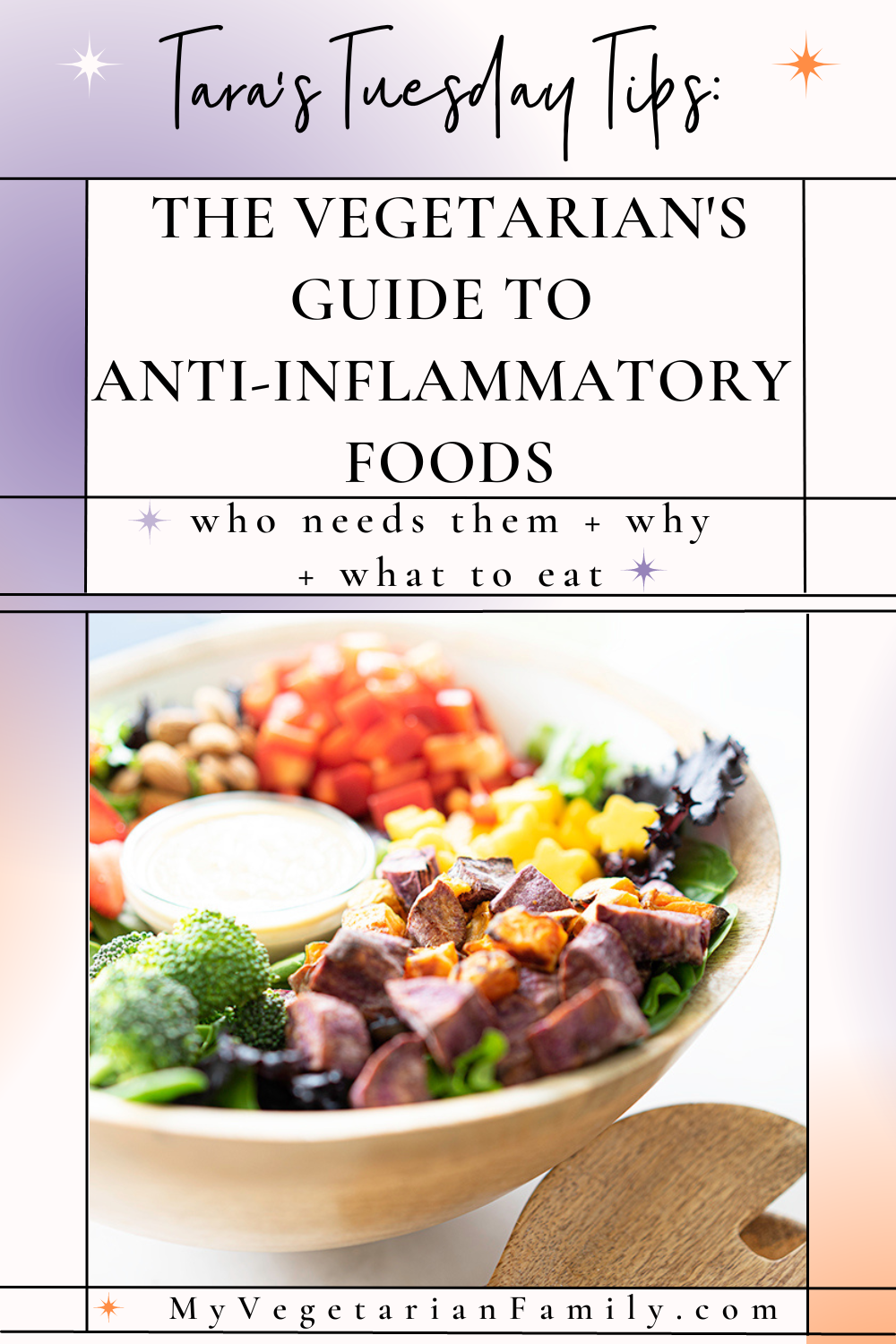
⭐Did you learn how to love vegetarian anti-inflammatory foods? Love it? Leave a comment + a rating below!
📸I love to see your creations! Follow me on Instagram @myvegetarianfamily and hashtag it #myvegetarianfamily
📩Be sure to subscribe here to my weekly emails for tips + recipes so that you never miss a veggie thing!
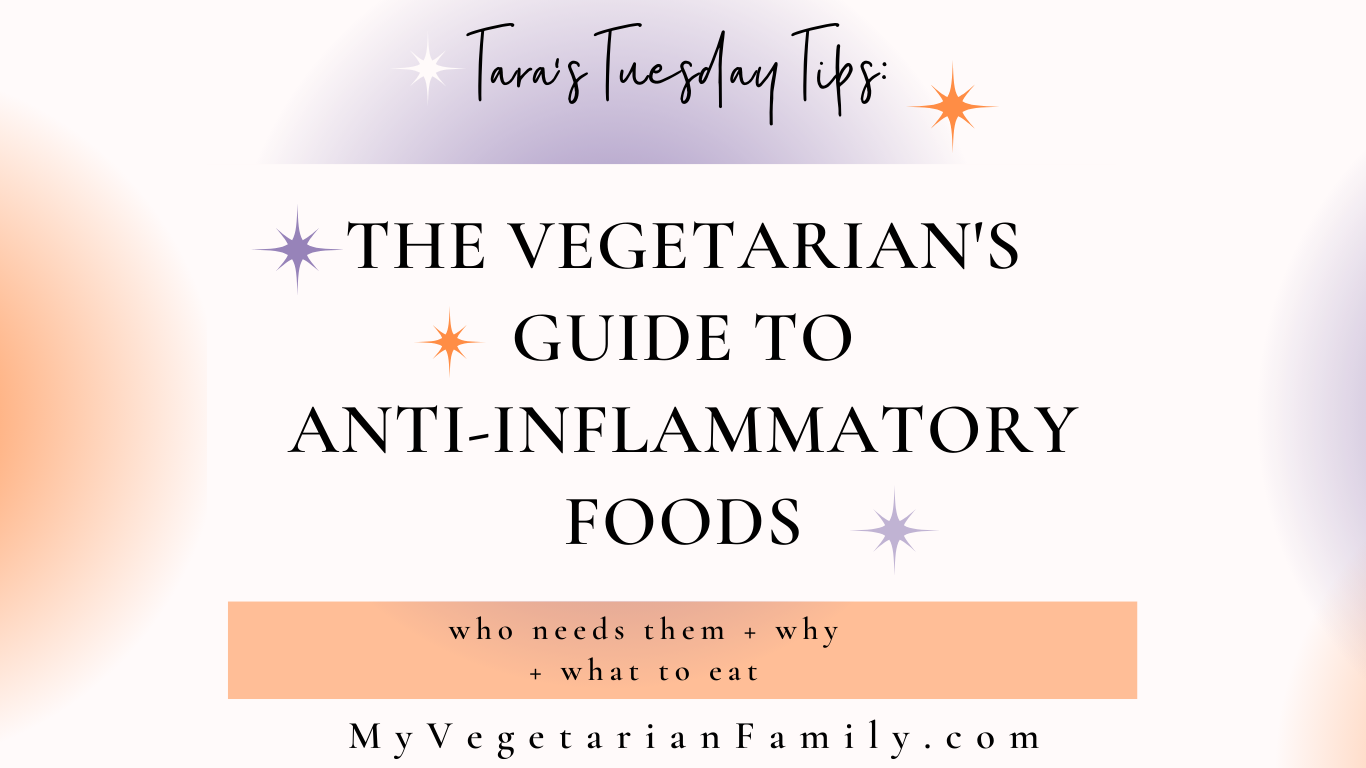
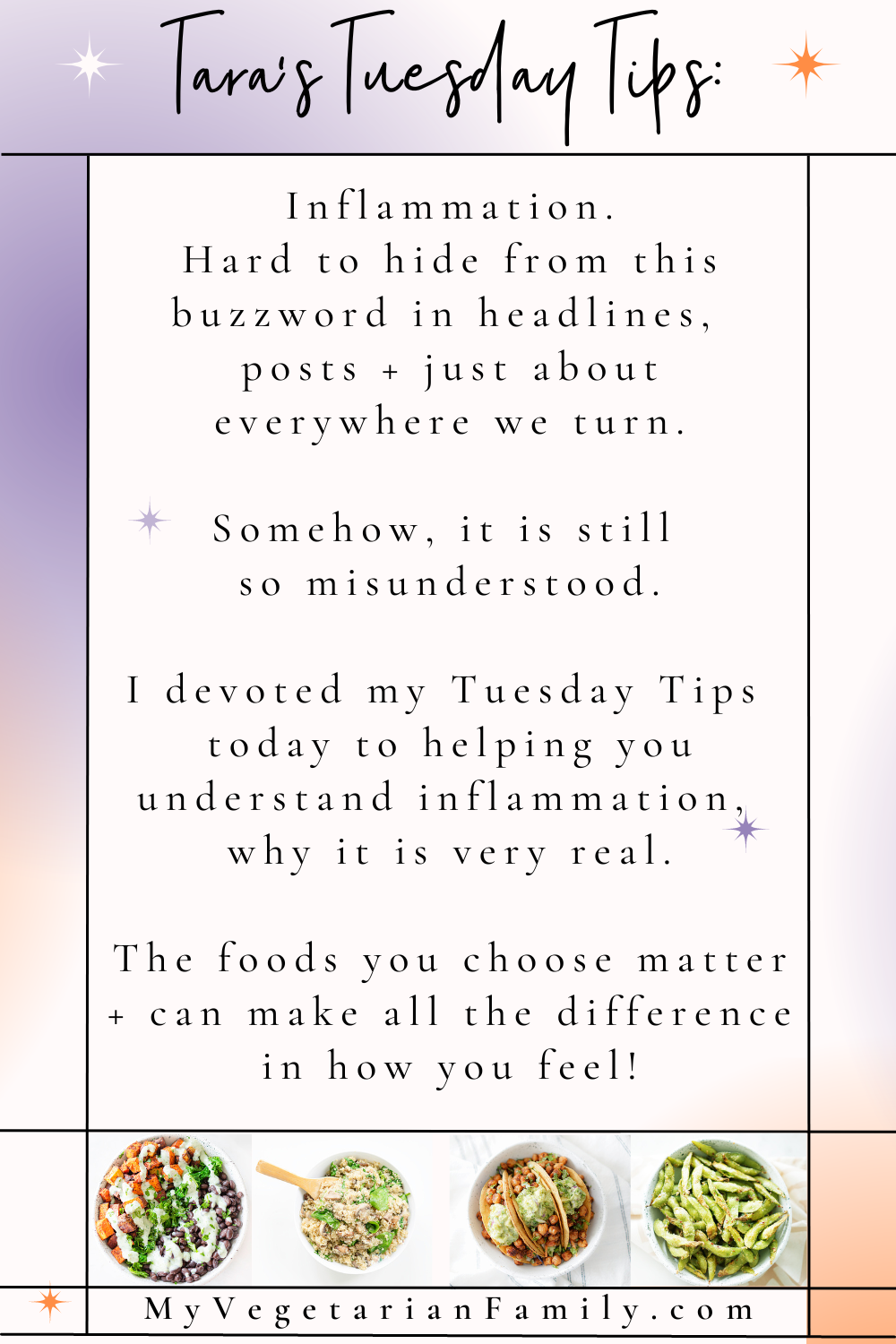
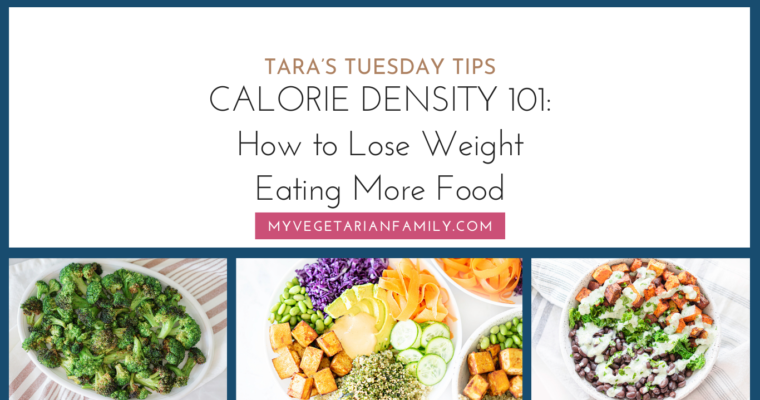
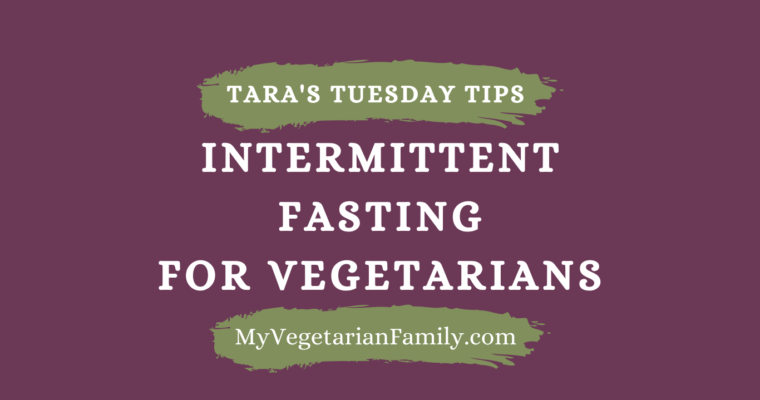

Good morning
I am trying very hard to cope with arthritis, without knee surgery. I’ve had both hips replaced and at the age of eighty two, can do without any more.
This had led me to do some research. It seems that inflammation is something to avoid. This has led me to look into foods that I can eat that are inflammation fighters.
I came upon your website and am very impressed with the information you have provided.
My wife and I are vegetarian so was a little disappointed to note that, when writing about vegetarian food, you include sushi, which obviously isn’t vegetarian..
apart from the mention of sushi, I have been enormously impressed and wonder if your article is based on science. Are you a dietitian? Whatever,. I intend to follow you in my quest to beat arthritis for as long as I can. I have a dog who needs to walk. 🥴
I signed up to your newsletter, by the way
Hi John! So happy you found my blog! You are right, there is a mention of fish and meat to make the example of foods that can increase inflammation if you were to consume them regularly. The “sushi” recipe you are referring to in my article is not fish, it is quinoa and tofu made to taste like sushi for vegetarians like me and you! You can find my recipe here: https://myvegetarianfamily.com/quinoa-sushi-bowls-with-tofu/
So happy you are here and I hope my articles help you on your vegetarian journey. You can read all about me and my vegetarian family here: https://myvegetarianfamily.com/welcome/ or here: https://myvegetarianfamily.com/how-i-got-here/
-Tara